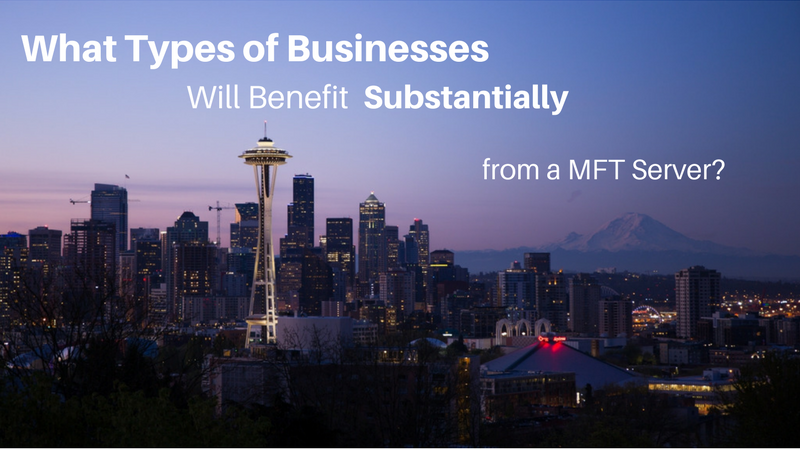Types of Businesses That Benefit from a MFT Server | JSCAPE

Overview
There are good investments and there are great investments. A piece of software can be a great investment if it makes a substantial impact to business. However, because each type of business has its own peculiarities, the extent of the same software's impact can vary from one business to another. There are those that can benefit immensely and there are those where the same software can make little to no impact at all.
In this post, we identify the types of businesses that can make excellent ROI out of a managed file transfer server acquisition. We hope this will help you determine whether an MFT server can be a great investment for you.

Businesses who transact with several other businesses
Companies that do business with multiple suppliers and/or customers have to make several B2B transactions. That usually means exchanging large volumes of electronic business documents (e.g. invoice, purchase order, ship schedule, load tender response, purchase order change, etc.) on a regular basis. To reduce delays, errors, and overall risk, these exchanges are best conducted through automated processes.
In addition, when a company has to make B2B exchanges with several organizations, that company will likely need to adapt to different exchange methods. Some large customers might require the use of EDI, while smaller organizations might only be capable of exchanging through email or some all-purpose file transfer protocol.
A managed file transfer server would make transacting with multiple organizations seamless and easy because it typically comes with automation-enabling features. Aside from that, it would readily support a wide selection of data exchange methods, including AS2 and OFTP (for EDI communications), and several other file transfer protocols, to accommodate each organization's data exchange preferences.
Businesses who need each transaction to be reliable and secure
B2B exchanges demand a higher degree of security than regular file transfers. Because these exchanges involve business documents, the parties involved would normally want to ensure that:
- The document reached the intended recipient;
- The document received was not tampered along the way;
- Sensitive data in the document is safe from prying eyes;
- The document received really originated from the supposed source
A MFT server ensures reliable and secure exchanges through a wide selection of security features, including:
- secure file transfer protocols that protect data confidentiality during transmissions;
- electronic receipts and other data integrity mechanisms;
- IP-based access and multiple authentication mechanisms to limit connections to trusted entities;
- and many others.
Those who need to automate not just file transfers, but entire business processes
Business processes don't just involve file transfers (i.e. file uploads and downloads). Many of these processes involve tasks like:
- picking up multiple files from one folder and moving them to another;
- waiting for an upload from a particular customer, making some changes on the uploaded file, and then forwarding the same to a trading partner;
- moving files to a directory, coming back to pick them up at the end of the day (presumably after some external processing), encrypting them, and then forwarding them to multiple trading partners;
- backing up files to the cloud or some remote server every 15th day of the month.
- and a host of other tasks (or a combination of them)
Many organizations still do these tasks manually, which can be time consuming and prone to error. A managed file transfer can take away majority if not all of the manual processes through powerful business process automation features.
Businesses who are subject to regulatory compliance
Some businesses are covered by laws and regulations like PCI DSS, HIPAA, EU Data Protection regulation, and SOX. When these businesses exchange files with other organizations, they're required to do so in a highly secure manner. If they don't and something goes wrong, they could be subject to onerous penalties like hefty fines and breach notification requirements.
While the fines themselves can be financially burdensome, the breach notification requirements can also be quite damaging. These notification requirements (which can range from phone calls to publications in state or national news media) are meant to warn people whose accounts were potentially compromised in the breach.
However, the side effect is that those people, after being appraised of the breach, will likely lose confidence in the business. In addition, the general public will also know about the incident (perhaps through word-of-mouth, social media, or published breach notifications) and will distrust the business as well. Unfortunately, loss of confidence/trust could translate to loss of business.
These data protection/privacy laws and regulations usually have technical requirements that enable businesses to avoid the breach notification requirements and perhaps the data breach themselves. Managed file transfer servers help businesses comply with these laws by providing certain security features that meet those technical requirements. The articles " Guide to HIPAA Compliant File Transfers " and " Guide to PCI DSS Compliant File Transfers " offer excellent examples in this regard.
Businesses who have people who work off-site
Some employees and executives who work on the field or go out on business trips may often find themselves in situations where they would need to retrieve files from the office or transmit files to office-based staff or superiors. In most cases, these offsite employees turn to email or cloud-based file sharing solutions to carry out file transfers.
Unfortunately, these solutions have serious limitations. Some aren't secure enough, while others just don't have the capacity to support large files. That can be a problem. But it's a problem that a managed file transfer server can easily address.
MFT servers are highly secure (see discussion above), capable of large file transfers, and able to support a wide array of file transfer options. Traveling and telecommuting employees and executives can connect to a MFT server and upload or download files through various options like secure file transfer clients, browser-based clients or through popular email clients equipped with a special plugin (read How To Send Large Files Through Email).
Businesses with an understaffed IT team
This is actually a common scenario. A large organization consisting perhaps of 1,000 or more employees served by an IT department of only 20 people or less, or a 200-man company served by only a 5-man IT team. Basically, almost all businesses have an understaffed IT department, many of which are already overloaded with a variety of tasks.
Many of these tasks aren't necessarily rocket science but they do eat up a lot of time. A considerable amount of an IT department's work hours are taken up by 'firefighting duties' like resetting passwords, removing viruses, and troubleshooting a variety of system and network issues. IT staff usually have very little time for developing solutions.
If you recall from our discussion earlier, B2B transactions and several business processes are best carried out through automated means. Automation can expedite processes, minimize errors, and boost cost efficiency. But in order to automate a process, you would need to introduce some form of automation mechanism.
Traditionally, this would mean writing scripts. Scripts are usually written by highly skilled system administrators or in-house developers. Unfortunately, not all organizations have this level of talent. And even if they did, these skilled individuals are likely already tied up with other business-critical tasks.
Managed file transfer solutions are perfect for these scenarios because they are usually equipped with automation-enabling features that no longer require any script-writing skill. Instead, they enable IT staff to automate workflows through intuitive, point-and-click graphical user interfaces. To learn more about these automation-enabling features, we invite you to go through our collection of business process automation articles.
Businesses who can't afford downtimes
In today's highly interconnected business ecosystem, almost every business belongs to some kind of supply chain. While a business acts a customer to one set of businesses, it may also act as a supplier of goods or provider of services to others. For this reason, any delay in a company's business processes can affect other businesses down the line.
It's therefore important to ensure that the systems vital to business processes be built to be as resilient as possible. File transfer servers, which are highly responsible for delivering data to and from trading partners, certainly fall into this category of "vital systems".
Managed file transfer servers are better equipped to handle business-critical processes than regular file transfer servers because they already have built-in high-availability mechanisms that reduce the probability of downtime.
Still not sure if your business can benefit substantially from a MFT Server?
Get answers to your questions. Talk to a file transfer expert now...